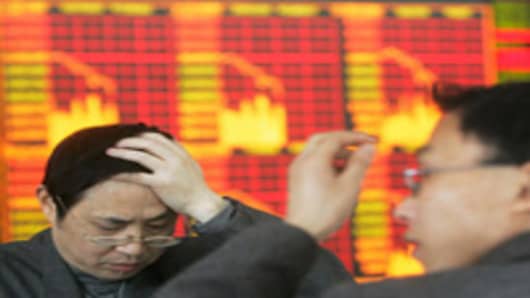Asian markets were massacred Friday, led by a 9.6 percent plunge in the Nikkei, as the global economic slowdown slashed earnings prospects for an array of companies, forcing investors to look to safer government bonds.
The stronger yen has been particularly damaging to the competitiveness of Japanese exporters as it curbs their overseas profits when they are brought home and erodes the competitiveness of their products. A handful of companies that have expressed positive outlooks have not been able to turn investor sentiment around to focusing on value rather than on the uncertainty of economic factors.
The yen climbed against the euro and other high-yielding currencies on rising risk aversion, hitting a 13-year high against the U.S. dollar . Oil prices gained on expectations OPEC would agree to cut output in an emergency meeting in Vienna, with Iran suggesting that it lower production by 2 million barrels a day. Crude futures are currently trading above $68 a barrel.
Japan's Nikkei 225 Average plunged 9.6 percent to hit a 5-½ year closing low, having lost 50 percent this year, with exporters hit by the double punch of a Sony profit warning and a sharply higher yen. Sony plunged more than 14 percent after the company halved its full-year profit forecast by 57 percent, to far below market estimates in its second downward revision this year, blaming a firmer yen and slowing demand for cameras and flat TVs.


